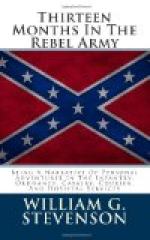The second day after the battle a sad accident added to the gloom. A crowd had assembled to see the monster Whitworth rifled gun fired off, as it had continued loaded since the day of the fight. She was named the “Lady Polk,” and the militant bishop and general was present to add interest to the scene. The gunner warned the crowd that there was some danger, but they heeded not, and pressed close around. The general stood near, why should not others? I stood within thirty feet, and as the gunner ran back with the lanyard, so did I. The next moment occurred the most terrific explosion I had ever heard. As the dust and smoke lifted, we saw the shattered remains of nine men; two more died subsequently from wounds received here. Both the percussion-shell and the gun had burst, and hence the destruction of life. General Polk narrowly escaped; his cloak was swept from him and cut in two as with a sword.
A word of this man, who laid aside his spiritual for military duties, will close my history of soldiering on the Mississippi.
Major-general Leonidas Polk is a tall, well-built man, about fifty-five years of age; hair slightly gray; wears side whiskers, which are as white as snow; aquiline nose, and firm mouth. His voice is a good one for command, and having a West Point education, improved by many years of research on military science, it was expected he would make a skillful general; but the people were much disappointed by his display of generalship in the Western Department, and many clamored for his removal. It was at one time thought he would be called to the Confederate cabinet as Secretary of State; but this was never done. Many of his old friends and admirers were pained to hear the report circulated, that the good bishop indulged in profanity when he got too deep in his potations; and as these reports were in part confirmed, his reputation suffered greatly.
CHAPTER III.
ORDNANCE SERVICE.
Transferred to Ordnance. — Camp Beauregard. — Was my Oath binding? — Resources of the Rebels. — Cannon stolen. — Manufactured. — A Rifling Machine. — Beauregard’s Bells. — Imported Cannon. — Running Blockade. — Silence of Southern Papers. — Small Arms made. — Altered. — Abundant. — Earnestness of all Classes. — Imported Arms. — England’s Neutrality. — Ammunition imported. — Manufactured. — Smuggled. — A Railroad Episode. — A Deserting Engineer. — A New Hand at the Throttle. — Caution. — A Smash Up and Pistols. — Reconciliation. — Result of Smash Up. — Bowling Green. — Size of Army. — Sickness. — Personal. — Kindness of Nashville People. — Moral and Religious Efforts for the Rebel Army. — Vices prevalent. — Seminaries and Schools disbanded.
On the 14th of November, I was breveted second lieutenant for the time, that I might take charge of a shipment of ammunition to Camp Beauregard, near Feliciana, a small town in Graves county, Kentucky, near the New Orleans and Ohio railroad, about seventeen miles from Columbus. This place was held by a brigade of about four thousand men, under Brigadier-general John S. Bowen, as a key to the interior, to prevent the Federal forces from attacking Columbus in the rear.




